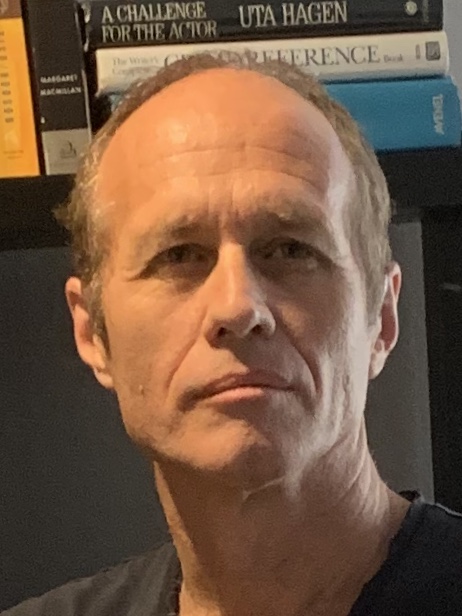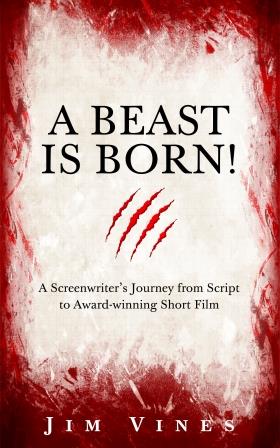
Terry McFadden came up through the ranks as a playwright having been produced
throughout the United States, the UK and Australia and winning several awards. From there he worked as a script consultant for ARD Television, Radio and Films and Eternity Pictures before starting off on his own. He has had the good fortune of giving studio notes to producers on scripts that got made such as THE GOOD GIRL, CONFESSIONS OF A DANGEROUS MIND and THE TRUTH ABOUT CHARLIE.
As the founder of Story Builders Script Doctor & Writing Services, he has covered, analyzed, given notes and consulted on hundreds of screenplays, TV pilots and story ideas and is dedicated to helping writers find and hone their own unique voice.
What’s the last thing you read or watched you thought was incredibly well-written?
JOKER. Without question. The absolute best script of 2019. From the very first page I loved the writing. Now, a lot of it is because I so identify with the charm and depth, the way it was done, the thematic and stylistic elements hit me right off. Not only was the lead character great and unique but he starts out as a very human but weird guy who has issues—issues that are clearly foreshadowed and then evolved. The story makes clear and piece by piece layers in not only his mental and delusional maladjustments but the idea that the way things turn out, as a result of his upbringing and belief systems and how he sees himself and world, is the only way it can end. This is developed wonderfully.
Screenwriters are taught to look at story, the characters and their arc, the twists, the spins, the reversals, the progressive development and surprises; a solid and rising structure with the catalyst plot points, midpoint, and the rest. All of that was there in JOKER but what kept me turning pages was the way it all weaved back in—supporting and commenting on what is already going on adding dimension. A real fresh slant on how he becomes not only his own hero but also the hero of those in need of such a person. The metaphors, the allegories, the songs, the running symbolic commentary—all snaking back and endorsing what is going on or will be, was both unpredictable, cool, necessary yet not seen coming in that way. Very well done.
How’d you get your start in the industry?
I started as a musician. Eight years old, I’m taking guitar lessons and my Dad tosses me onstage with “Tommy Schaefer’s Country/Polka Band at Jim Thorpe Memorial Park”. Music is a big part of everything I do. Writing is music. I came to formal writing at Penn State, penning funny essays about people and teachers. But it took off in Los Angeles in 1993 or so, when I began to write short scenes and monologues for the theatre. I became a member of Actors Art Theatre in Hollywood and remained there for four and a half years—this is where I really developed my style of writing.
Writing scenes progressed to ten-minute plays, short plays and one acts. The director and founder of the theatre was a real mentor to me and a great means of support. From there I studied at UCLA and AFI, did coverage and analysis for several production companies for a while, continued to write, act and produce plays and scripts. I then went out on my own as a script doctor.
Is recognizing good writing something you think can be taught or learned?
Absolutely – for both. The “craft”, to me, comes first. Learning about story, character development and structure–how to turn an idea into 110 pages of course, is the gig here. So in order for me to recognize it, I had to learn it. I had to discover what structure does, why and how–what makes great story points and all of the rest. When you are reading tons of scripts and attending workshops and seminars by a lot of the great teachers like I have, the recognition of good writing becomes second nature because you’re also seeing bad writing and discovering why.
Writers who want to grow and become better intuitively know they need some help. My job is to provide that while showing them their promise as well. Their promise is what we develop. Writers who are open to and then apply good notes will see right off how it betters the work—this is “being taught”.
What do you consider the components of a good script?
A memorable story, clear and fresh characters and building structure as I mentioned above, but for most of us, that’s a given. Good scripts need to be engaging and surprising too.
Stories that emotionally move you as well as make you feel that you are there. The mark of great writing is a piece that has the reader or audience invested and rooting, one way or the other – eliciting an emotional response. Even though readers may not identify with the situation they will identify with the emotional life of what the character is going through, the actions and the way the characters behave, and this is because of the human experience.
What I consider the most important component of all of this is that the writer tell the story in a fashion that only her or she could—their own unique voice. This is who they are and how they see the world that nobody else does. The first thing I look at when reviewing a script is the description and I ask myself, “is this textbook or is this from a perspective that I’ve never seen before?” A script that has a unique and personal voice to it is already leagues ahead as the writer understands not just story, but “their” story and how to get that across.
What are some of the most common screenwriting mistakes you see?
Lack of prep and what’s worse, thinking that you don’t need it. Okay, great ideas make great stories but only if the idea is turned into a script that encompasses the story and structural elements to evolve, build, grow, sustain and resolve in 110 pages.
Another mistake is writing “pot-boilers”, that is, trying to copy what is out there without having a believably sustaining basis for the human aspect. Without a strong and personal character take, motivation, true want and need, you’re writing purely externals. Externals don’t get it for me. I need to know why.
Another mistake is that Act Two putters out and the scenes begin to get episodic and meandering. Biggest one is protagonist trade-offs: The protagonist, because of lack of drive, stakes, want and need is passive so the action is progressed by secondary characters thus confusing the lines and creating tangential sub-plots that do not correspond with the concept or original goal of the protagonist. I am a big proponent of using an outline. Sure, you could waver from it, but, do so in the context of the story that you are now familiar with—this is true and correct inspiration. Write an outline or treatment and get notes on that first. You’ll save yourself not only time but ego deflation and bouts of self-doubt. All comes down to execution on the page.
What story tropes are you just tired of seeing?
I’d have to say voice-over as it’s so overused. If you’re going to use a narrator, and this goes for all devices and conventions, ask how is this still serving the story yet different, adding, and, could it only come from me? Is the narrator a character? Do they know the ending? Are they commenting in a way that goes against the cliché? Are they oblivious, dumb, judgmental? Are they an active character? Also, mentors who are older and have it somewhat together.
Photos on the wall or mantle showing who the characters were and what they did before we see them. I feel that exposition should be meted out when essential and in story forwarding form in crucial times and scene beats.
Lastly, villains that are too dark and mean. My take is that antagonists and villains are the protagonist in their own story; they’re just at cross-purposes with the hero. If you can show why antagonists do what they do and their reasoning, it’ll be more interesting. Watch the original FRANKENSTEIN bopping and stumbling all over the place, and tell me you don’t feel for him.
What are some key rules/guidelines every writer should know?
Write dialogue that differentiates the character as per who they are, their world, POV and experiences. Dialogue that only they could say.
Make sure it’s your world; your voice; your take—only you could have written this. The hook, the take, the scenario and the point of view could have only come from you. Not just overall conflict but inner scene conflict between the characters needs to be present evolving and resolved in some fashion, especially if they’re on the same side. Individual stakes and progressive character function is vital.
Do not have a character if he or she does not only have a role but also a function. How are they influencing the story and the hero? What happens to turn the story because of them?
Keep us guessing. Great scripts set up surprises, twists and reversals that catch readers off-guard yet make sense as per the foreshowing early on. There is no such thing as “out of the blue” (some comedies and farce exempt) even if you think it is. Everything that happens in Act Three is foreshadowed in some way and credible to this story.
Be open to changes; be open to collaboration; be open to notes that are going to improve the vision overall. Screenwriters are subjective and we need another pair of eyes that are not our own. We need to understand that getting sold, published and produced demands active collaboration. Get notes, shut up or drive a bus. Keep writing. This is a process and you learn as you go. Will you get better at it as you go? Probably. Will you evolve as a writer? Absolutely.
Have you ever read a spec script that was an absolute, without-a-doubt “recommend”? If so, what were the reasons why?
Yes. I reviewed a coming of age drama, a TV pilot, that looks at one night in the lives of several late-teen/early 20’s pizza delivery-service workers, concurrently and from all of their points of view. So different were the characters yet all dealing with their own private teen angst. Phenomenal use of subtext; great devices and conventions that were imaginative, unseen before yet fell right in line with the voice and concept.
This slice of life story very convincingly depicted the trials of young adults searching for love but settling for sex and left me with the feeling of hope and the promise of their journeys to come. Because this pilot opened up so many possibilities for all four of the leads, I felt it could go for many episodes and progress uniquely as well. Great writing.
How do you feel about screenwriting contests? Worth it or not?
Only if you do well. Screenwriting contests can help leverage a career but again, you need to have a good script that is recognized by the contest. Bigger question is how are you going to get your script out there? Contests are simply one road and not for all of us.
How can people find out more about you and the services you provide?
You can check out my website at www.storybuilderswrite.com. I’m also on Twitter at @Storybuilderz and on LinkedIn at https://www.linkedin.com/in/storybuilders/
I also have a new e-book entitled, “That Sounds Like Me’ – ‘Implementing your Own Unique Voice into Act I of your Screenplay or TV Script’. The book takes a comprehensive approach to the usual refrains on getting your life and slant on the page. By delving into how the writer’s natural voice need influence all aspects of the process, it demonstrates how story tools such as Opening Image; Character Construction; Backstory and Exposition; Hooks; Allegories, Metaphors and Themes work together, complement each other, are part of the same world and why. Go to my website and sign in and I’ll send you the book for free, as a gift to you.
Readers of this blog are more than familiar with my love/appreciation of pie. What’s your favorite kind?
Ha! I’m going to bend the genre here and go with New York Cheesecake – graham cracker crust and bottom.









